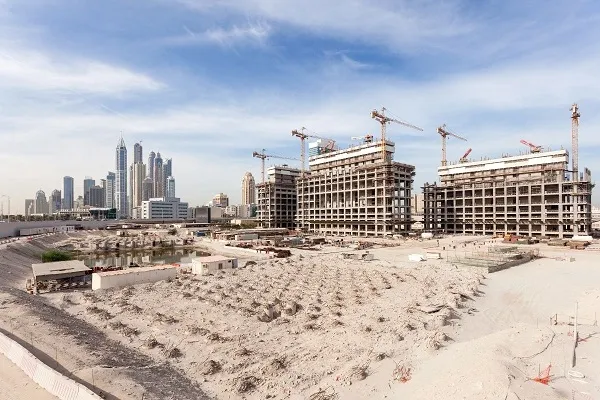Do you want to know the impact of inflation on off-plan investments on real estate projects? Here, we will enlighten you on the various impacts of inflation on off-plan investments on real estate projects.

Off-plan property investments are often viewed as a smart way to secure real estate at today’s price while gaining value by the time construction finishes. However, inflation can significantly affect these investments.
As the cost of living rises and currencies lose value, both developers and buyers face new challenges. Inflation can impact everything from material costs to payment plans, project timelines, and eventual resale value. Without understanding how inflation influences off-plan projects, investors may face unexpected financial stress or reduced returns.
In this guide, we’ll break down the direct and indirect effects of inflation on off-plan property deals, so you can prepare and make smarter investment choices.
Impact of Inflation on Off-Plan Investments
Here some impact of inflation on off-plan investment that you should take note of:

1. Rising Construction Costs
Inflation directly impacts the cost of construction materials such as cement, steel, glass, plumbing fixtures, tiles, and finishing materials. When prices surge, developers are forced to spend more than initially budgeted. This affects not only the cost structure but also the feasibility of the project.
In off-plan investments, the budget is typically fixed at the time of launch, and high inflation can turn what was once a profitable venture into a challenging one. Many developers may struggle to keep up with ongoing expenses or might compromise on the quality of materials to manage rising costs. This can ultimately affect the value and durability of the final product.
Buyers may also face unexpected price adjustments, making it crucial to check contract clauses for potential cost variations. Understanding how inflation drives up costs helps investors better assess the risk involved and prepare for any shifts in pricing or quality.
2. Impact on Project Timelines
Inflation often causes disruptions in the supply chain, leading to delays in acquiring materials and hiring skilled labor. As prices increase, some materials become scarce or take longer to procure, especially when importation or logistics are involved.
These delays directly impact construction schedules, pushing back key milestones and extending delivery dates. For off-plan buyers, these setbacks can be frustrating, particularly if they had planned on using the property for rental income or resale at a specific time.
Developers facing budget constraints due to inflation may pause certain phases of the project to secure more funds or cut corners to save costs, both of which contribute to missed timelines. Such changes can reduce buyer confidence and affect the perceived value of the investment.
For this reason, it’s crucial for investors to choose developers known for meeting deadlines and to include strong delivery clauses in their contracts for better protection.
3. Contract Price Adjustments
One of the biggest risks inflation brings to off-plan investments is contract price adjustment. While most buyers assume the agreed purchase price is fixed, developers may include clauses in the agreement that allow for price reviews if material or labor costs increase significantly.
These are often known as escalation clauses. If inflation spikes during the construction period, developers may activate these clauses to transfer part of the rising costs to the buyer.
This could mean unexpected requests for additional payments or changes to the unit features. Such adjustments strain the buyer’s finances and often lead to dissatisfaction. That’s why it’s essential to thoroughly review the sales agreement before committing.
Buyers should involve a qualified real estate lawyer to explain the contract in detail and identify any clauses that may be triggered by inflation. Clear legal protection ensures you’re not caught off-guard when market conditions shift unexpectedly.
4. Reduced Profit Margins for Developers
High inflation squeezes developers’ profit margins by raising overall construction costs, sometimes beyond their initial financial estimates. When profit margins shrink, developers are forced to make difficult decisions.
Some may scale down on building specifications or finishes to save money, which affects the quality of the final product. Others may delay project timelines while seeking additional funding. In more severe cases, inflation may even threaten the continuation of the entire project if it becomes financially unsustainable.
These challenges can lead to tension between buyers and developers, especially when promised features are altered or removed. From an investor’s perspective, reduced developer profits can compromise project quality and timelines, which ultimately impacts the long-term value of the property.
This is why investors should always assess a developer’s financial health and previous experience before buying off-plan. A financially resilient developer is more likely to complete the project without compromising standards.
5. High Effect on Mortgage and Financing
Inflation has a direct impact on interest rates. As inflation rises, central banks typically increase interest rates to stabilize the economy. For real estate investors, this means mortgage loans become more expensive.
Monthly repayments go up, and overall affordability decreases. Off-plan buyers who rely on financing may find it harder to secure loans at favorable terms. Some buyers may even struggle to meet their payment obligations, especially if they did not anticipate rising costs.
Furthermore, when interest rates increase, the general demand for property tends to slow down, affecting the resale or rental potential of the property once completed. It’s critical for buyers to evaluate financing options before committing to an off-plan deal.
Working with a financial advisor can help buyers lock in rates early or choose the most cost-effective financing strategy. Inflation-proof financial planning is key to securing your investment under changing economic conditions.
6. Property Value Appreciation
Despite inflation’s challenges, one potential advantage for off-plan investors is property value appreciation. As the cost of materials, labor, and land increases, so does the market value of real estate. Investors who secure a unit early, before inflation peaks, may enjoy significant capital gains by the time the project is completed.
This makes off-plan investments attractive in the long run, especially in high-demand urban areas. However, appreciation depends heavily on timely project delivery and quality execution. Delays or compromised building standards can diminish this potential. Additionally, inflation must not outpace rental yield or market demand. For this reason, investors should analyze location trends, developer reputation, and potential for capital growth.
Buying early and from reliable developers gives buyers a price advantage that could translate into solid returns, even when inflation affects other parts of the economy. When managed wisely, inflation can become a growth driver rather than a risk.
7. Increased Developer-Buyer Tension
Inflation-related challenges can lead to increased friction between developers and buyers. Unexpected delays, cost adjustments, or reduced property specifications often frustrate investors who expected a smooth process.
Without proper communication, trust erodes quickly. Developers may hesitate to share bad news, while buyers feel left in the dark. Misunderstandings escalate, and legal disputes may follow. To avoid these problems, transparency is critical. Developers should maintain regular updates through emails, site visits, or progress reports.
Clear communication about timelines, challenges, and solutions helps buyers stay informed and reassured. For buyers, it’s important to manage expectations and maintain open dialogue with project managers. When both parties understand their roles and responsibilities, the relationship remains cooperative.
Strong communication bridges the gap inflation creates and keeps the investment on track. A proactive and transparent approach from both sides builds the trust needed to see the project through to completion.
8. Importance of Strong Legal Agreements
Legal protection is essential when inflation threatens the stability of off-plan real estate investments. Buyers must insist on clear, comprehensive contracts that outline all responsibilities, costs, timelines, and remedies.
Inflation-specific clauses such as price variation terms, delay penalties, and refund conditions should be clearly stated. Without such provisions, buyers may have little recourse when unexpected cost increases or delays occur.
A well-drafted agreement offers legal leverage and can prevent financial loss or disputes. It’s vital to engage a qualified real estate lawyer to review every detail before signing.
In conclusion, inflation has a wide-ranging impact on off-plan investments, from rising costs and construction delays to reduced returns and financial strain.
Related Post:




